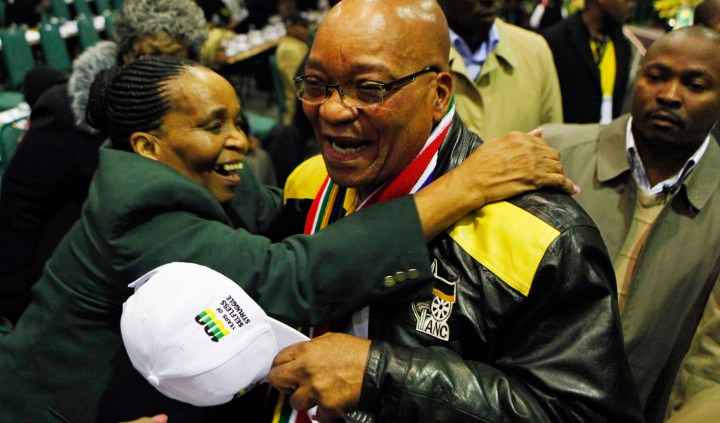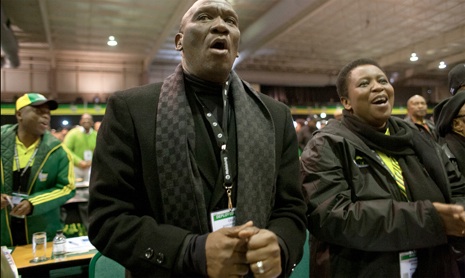South Africa
ANC policy conference: The illusion of change. To ensure more of the same.

“I don’t see why we should take the blame.” A loaded statement that sums up President Jacob Zuma’s attitude towards the failings of the ANC and government. Yet he is advocating “drastic” and “radical” policy change at this week’s ANC policy indaba. It’s a clear survival tactic and a means to buy time for his presidency. By RANJENI MUNUSAMY.
If you listen carefully, it would appear President Jacob Zuma is hoping that delegates attending the ANC policy conference in Midrand would come up with some new, fantastic, never-thought-of-before policy proposals that would solve South Africa’s social and economic problems.
Even though the 13 policy discussion documents up for debate at the conference do not contain any such extraordinary proposals, Zuma says the ANC delegates should not be “confined” by documents and “begin to apply their minds” to come up with ways to tackle the problems besetting the country’s citizens.
“We may end up with resolutions which have more than what is in the documents,” Zuma told a media briefing on Tuesday. “We need radical change.”
Earlier, in his address opening the four-day conference, Zuma said: “The time has come to do something more drastic to accelerate change, towards economic transformation and freedom”.
He says a “radical shift towards economic and social transformation” and “a militant programme of action” was required to deal with poverty, inequality and unemployment.
“The level of frustration in some communities is high and understandably so. While many have received basic services, many more are still waiting for electricity, water, sanitation, proper roads, trains that run on time all the time, decent housing as well as clinics that have medical staff and medicines in certain areas.
“From time to time, people resort to protests to voice their anger, which sometimes turn violent,” Zuma said.
The president told the media he was not able to sleep peacefully at night because he was worrying about the levels of poverty in South Africa.
This, apparently, is the motivation behind the much-vaunted “Second Transition” which has attracted clear “for” and “against” lobbies – which happen to coincide with provincial blocs in support of and opposed to a second presidential term for Zuma.
Despite the divisiveness around the subject of a second transition in the run- up to the policy conference, Zuma again justified why it was needed.
“What solutions will be brought by the second transition? To improve government performance, we must develop an effective democratic developmental state. The state has a number of instruments that it can use to improve and drive transformation.
“These include the national budget, state-owned enterprises and the macroeconomic framework, including policy on monetary, fiscal, labour, industrial policy and trade matters. The ANC must also pay attention to improving the capacity of the public service, at professional, technical and numerical levels.”
Zuma appears oblivious or is trying to detract from the fact that these problems arise from failures and poor performance of his and previous administrations. When asked whether the diagnostic reports of government and even those quoted in the second transition document showing the logjams in delivery and weaknesses in government were not an indictment on his presidency, Zuma said he did not think the state was failing.
He said the main factor behind South Africa’s social and economic ills was its history – three centuries of exploitation and apartheid.

The “don’t blame us” sentiment was also expressed to the ANC delegates.
“Amongst underlying causes of the slow pace towards economic freedom, is the fact that ahead of the 1994 breakthrough, we went through a negotiations process at Codesa followed by a negotiated settlement. We had to make certain compromises in the national interest and these were necessary.
“For example, we had to be cautious about restructuring the economy, in order to maintain economic stability and confidence at the time. Thus, the economic power relations of the apartheid era have in the main remained intact. The ownership of the economy is still primarily in the hands of white males, as it has always been,” Zuma said.
Despite tapping into populist sentiment, Zuma says he is not advocating for wholesale changes to the Constitution or legislation.
Even his boldest statement in the opening speech, a review of government policy on land, he said must be done “within the confines of the Constitution and the law”.
Zuma came as close as possible to mentioning nationalisation – the concept used as a campaign tool by some of his opponents – by saying “conference must deliberate on how the state can obtain an equitable share from the mineral resources and how communities can benefit more from this national resource”.
On the party front, Zuma wants the structure and functioning of ANC branches to change.
“What are their duties and tasks,” he asked. Zuma said the ANC needed to be everywhere so it knew where the challenges were, and then it could advise the government. ANC members needed to ensure the party was “alert and effective” so it could deal with issues, he said.
But while organisational renewal was needed, “the ANC should be able to cleanse itself of alien tendencies which range from wanton ill-discipline to those linked to incumbency.”
“These tendencies include social distance, patronage, careerism, corruption and abuse of power; ineffective management of the interface between the movement and the state; a flawed approach to membership recruitment and a decline in ideological depth amongst cadres,” Zuma said.
So where then is the “drastic” and “radical” change he seems to be pushing for? Zuma is not able to answer the question with specifics, only that the ANC delegates need to come up with something different or the ANC “could be faced with the anger of the people”.
Although he did not author the second transition document, Zuma says he has “sharpened the debate on the matter”. If the policy conference decided not to opt for a second transition, it would not be a “reflection on an individual”, he said. In other words, it should not be read as ANC delegates rejecting his leadership. But if they did not support the concept, it would constitute a “failure” by the ANC to deal with the problems plaguing society, he said.
The problem for Zuma is that many of the delegates listening to his speech on Tuesday disagree with him. “We are not convinced by the attempts to justify the second transition,” said one Limpopo delegate. “This is a PR exercise to make them sound different from Mbeki’s administration… It creates a deceitful sense of false change.”
But others applauded loudly when Zuma said in the speech that the ANC could not sit idly by while poverty levels increased and that extraordinary measures were needed to reverse the situation.
The deep divisions in the party were not out in the open at the policy conference’s opening day. When Zuma sang his trademark Mshini Wam song, which was a hallmark of his campaign in the run-up to the 2007 ANC conference, all the delegates sang with delight and in harmony.
When ANC spokesman Jackson Mthembu introduced Zuma at the press conference, he called him the “head of the family”. And though the ANC is maintaining its ban on campaigning, songs in honour of Zuma are allowed because he is the “face of the party”. These songs were not about the leadership elections in Mangaung in December, Zuma explained to journalists, but in praise of ANC leaders, just as it had been the case with all the party’s past presidents.
But it is doubtful whether the façade will hold up over the next three days as delegates delve into policy debates in commissions. The 3,000-odd ANC delegates representing a million ANC members across the country will decide on the policy trajectory for the ruling party for the next five years. Already some delegates are complaining that many of the resolutions are pre-conceived and that they were being used to rubber-stamp these.
It remains to be seen whether the delegates buy Zuma’s explanation that the ANC government was not to blame for South Africa’s dire economic and social conditions and are able to deliver on the president’s wish for new policy proposals to address the “mess” the country is in. If they do, it could give Zuma’s presidency a much-needed lifeline. DM
Photos – Main: President Jacob Zuma (C) arrives for the start of an African National Congress (ANC) policy meeting in Midrand, north of Johannesburg, June 26, 2012. (REUTERS/Siphiwe Sibeko)
Second: Sacked police commissioner Bheki Cele sat in the front row as Zuma opened the conference. He was warmly greeted by the president and SAPS policing the venue.



















 Become an Insider
Become an Insider